-
ORIGINAL ARTICLE02-03-2023
Quality of life and satisfaction of students with auriculotherapy in the covid-19 pandemic: a quasi-experimental study
Revista Brasileira de Enfermagem. 2023;76:e20220522
Abstract
ORIGINAL ARTICLEQuality of life and satisfaction of students with auriculotherapy in the covid-19 pandemic: a quasi-experimental study
Revista Brasileira de Enfermagem. 2023;76:e20220522
DOI 10.1590/0034-7167-2022-0522
Views0See moreABSTRACT
Objectives:
to evaluate the quality of life before and after the application of auriculotherapy and the satisfaction of university students with the treatment during the covid-19 pandemic.
Methods:
quasi-experimental study conducted with 44 students in a University Health Center. The intervention consisted of ten sessions of auriculotherapy focusing on emotional changes with quality of life assessment before and after treatment. The study also investigated the satisfaction concerning the intervention.
Results:
predominated among the students: women, from health courses, in use of psychotropic drugs and complaining of emotional changes. There was a statistically significant increase in all domains of quality of life, and students were satisfied with the treatment.
Conclusions:
auriculotherapy improved the quality of life of university students during the covid-19 pandemic, and the level of satisfaction with the treatment was high.
-
ORIGINAL ARTICLE02-03-2023
Factors associated with the safety culture of patients under dialysis in the context of the COVID-19 pandemic
Revista Brasileira de Enfermagem. 2023;76:e20220280
Abstract
ORIGINAL ARTICLEFactors associated with the safety culture of patients under dialysis in the context of the COVID-19 pandemic
Revista Brasileira de Enfermagem. 2023;76:e20220280
DOI 10.1590/0034-7167-2022-0280
Views0See moreABSTRACT
Objectives:
to assess the factors associated with the safety culture of patients under dialysis in the context of the COVID-19 pandemic.
Methods:
a cross-sectional and analytical study, carried out in Minas Gerais, with 134 professionals from three dialysis services. The Hospital Survey on Patient Safety Culture, adapted for Brazil, was used.
Results:
only variable type of management was associated with the highest percentage of positive response in public and private services. Patient safety was rated as good by 55.7% of respondents. In dimension assessment, the public service presented one strength and five weaknesses, the private service did not present weak areas, and the philanthropic service presented a weakness. The priority areas for improvement actions are represented by dimensions “Nonpunitive response to error” and “Staffing”.
Conclusions:
interventions should consider the type of service management, as it is a factor associated with safety culture.
-
ORIGINAL ARTICLE02-03-2023
Remote teaching during the COVID-19 pandemic: repercussions from professors’ perspective
Revista Brasileira de Enfermagem. 2023;76:e20220172
Abstract
ORIGINAL ARTICLERemote teaching during the COVID-19 pandemic: repercussions from professors’ perspective
Revista Brasileira de Enfermagem. 2023;76:e20220172
DOI 10.1590/0034-7167-2022-0172
Views0See moreABSTRACT
Objectives:
to understand the repercussions of teaching work in remote teaching during the COVID-19 pandemic in Higher Education Institutions in northern Santa Catarina.
Methods:
a qualitative participatory action research, based on Paulo Freire’s theoretical-methodological precepts. Seventeen health professors participated in two Virtual Culture Circles held in the first half of 2021.
Results:
six generating themes emerged for discussion, which aroused in participants’ feelings and perspectives regarding the remote teaching process in the pandemic context, with an emphasis on the connectivity theme, which generated dialogue through reports of personal experiences.
Final Considerations:
the pandemic has had repercussions in sectors such as health and education. Professors talked about their experience in creating, recreating and adapting to remote teaching and the challenges facing the teaching-learning process, listing the worsening of mental health and the need to learn new digital technologies.

-
ORIGINAL ARTICLE01-30-2023
Pressure injury prevention in older people: construction and validation of an instrument for caregivers
Revista Brasileira de Enfermagem. 2023;76(1):e20210930
Abstract
ORIGINAL ARTICLEPressure injury prevention in older people: construction and validation of an instrument for caregivers
Revista Brasileira de Enfermagem. 2023;76(1):e20210930
DOI 10.1590/0034-7167-2021-0930
Views0See moreABSTRACT
Objectives:
to construct and validate an instrument to assess the knowledge, attitudes, and practices related to pressure injury prevention among caregivers of institutionalized older people.
Methods:
this is a three-stage methodological study that consisted of instrument construction, analysis by experts, and semantic and appearance analysis, with 78 participants, observing the validation process steps for psychometric instruments in the criteria of clarity and relevance.
Results:
in the Delphi I round, the validity index of the general content in the clarity criterion was 0.66, in relevance 0.85, and the Kappa value was >0.76. In Delphi II, clarity was 0.95, relevance 1.00, and the Kappa value was >0.97.
Conclusions:
this is a valid instrument in terms of content and appearance, which allows further analysis of its reliability for the measurement of the constructs for which it is intended. Therefore, it can be considered a tool for care management in pressure injury prevention.
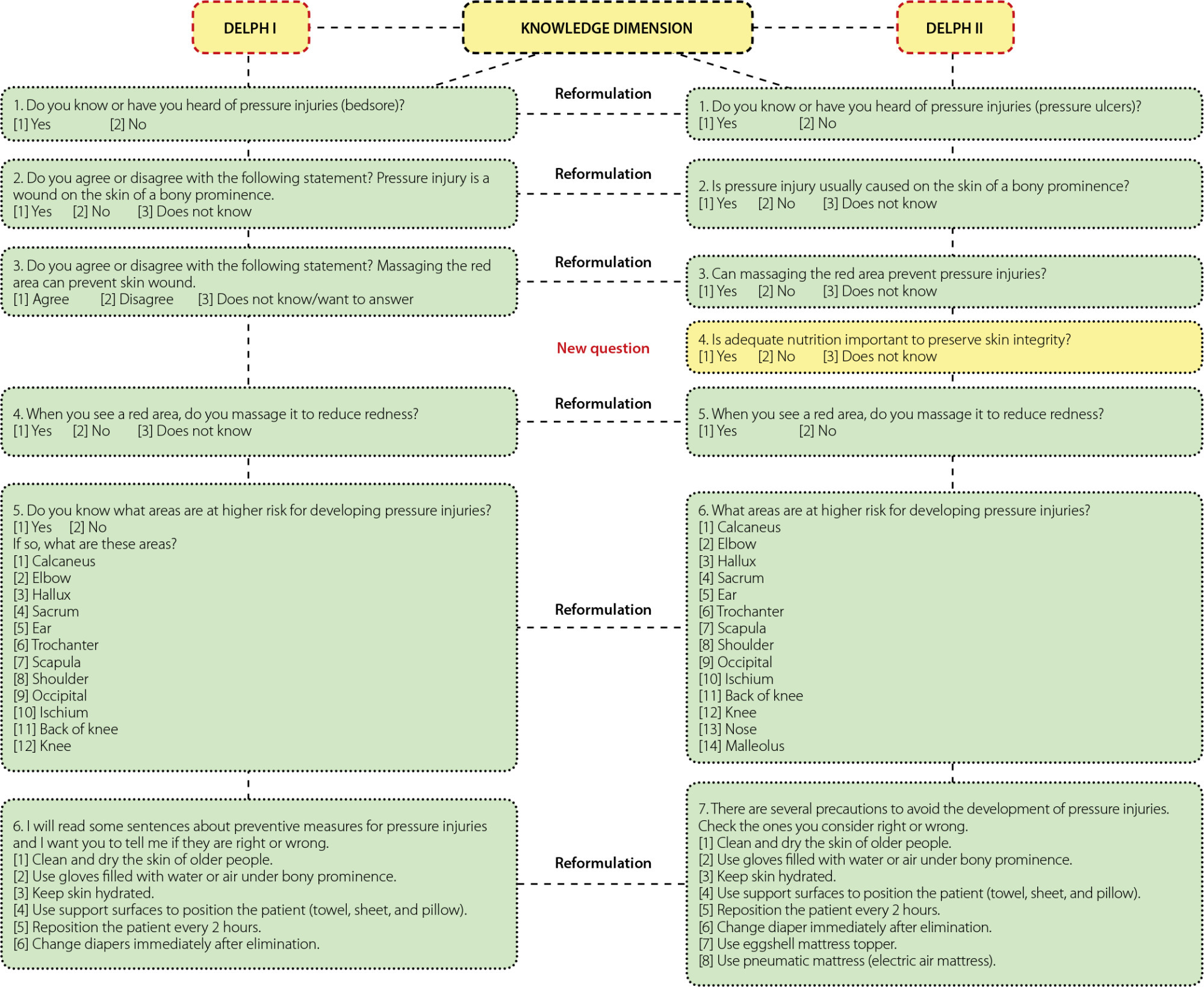
-
ORIGINAL ARTICLE01-30-2023
Accuracy of the nursing diagnosis of ineffective airway clearance in intensive care unit patients
Revista Brasileira de Enfermagem. 2023;76(1):e20220174
Abstract
ORIGINAL ARTICLEAccuracy of the nursing diagnosis of ineffective airway clearance in intensive care unit patients
Revista Brasileira de Enfermagem. 2023;76(1):e20220174
DOI 10.1590/0034-7167-2022-0174
Views0See moreABSTRACT
Objectives:
to analyze the accuracy of the clinical indicators of ineffective airway clearance in adult intensive care unit patients.
Methods:
diagnostic accuracy study, performed in the intensive care unit of a university hospital in northeastern Brazil. The sample consisted of 104 patients hospitalized between June and October 2019.
Results:
the prevalence of ineffective airway clearance was 36.54%. The indicators with high specificity included absence of cough (0.8326), orthopnea (0.6817), adventitious breath sounds (0.8175), and diminished breath sounds (0.8326). The clinical indicators with high sensitivity and specificity were alteration in respiratory rate (0.9999) and alteration in respiratory pattern (0.9999).
Conclusions:
six clinical indicators provided an accurate identification of ineffective airway clearance. The clinical indicators alteration in respiratory rate and alteration in respiratory pattern were the most accurate for critical adult patients. The findings of this study contribute to accurate diagnostic inferences and to prevention of respiratory complications in these patients.
-
ORIGINAL ARTICLE01-30-2023
Adverse dermatoneurological events and impacts on daily activities of patients with gastrointestinal neoplasms undergoing chemotherapy
Revista Brasileira de Enfermagem. 2023;76(1):e20220161
Abstract
ORIGINAL ARTICLEAdverse dermatoneurological events and impacts on daily activities of patients with gastrointestinal neoplasms undergoing chemotherapy
Revista Brasileira de Enfermagem. 2023;76(1):e20220161
DOI 10.1590/0034-7167-2022-0161
Views0See moreABSTRACT
Objective:
to associate the presence and grading of adverse dermatoneurological events (peripheral neuropathy and hand-foot syndrome) and the interference in the activities of daily living of patients with gastrointestinal neoplasms undergoing systemic antineoplastic treatment.
Method:
this is a longitudinal, prospective study, using instruments to assess hand-foot syndrome and peripheral neuropathy.
Results:
there were 36 patients: 66.7% diagnosed with colon cancer and 83.2% on combination therapy. From cycle 5 onwards, all of them had hand-foot syndrome, with a majority of grade 1, unrelated to interference in activities of daily living. Regarding peripheral neuropathy, there was a moderate to strong correlation from cycle 1 of treatment.
Conclusion:
peripheral neuropathy negatively affects activities of daily living. The monitoring of dermatoneurological events by oncology nurses contributes to the clinical practice of nursing and subsidizes the development of advanced practice in the country.
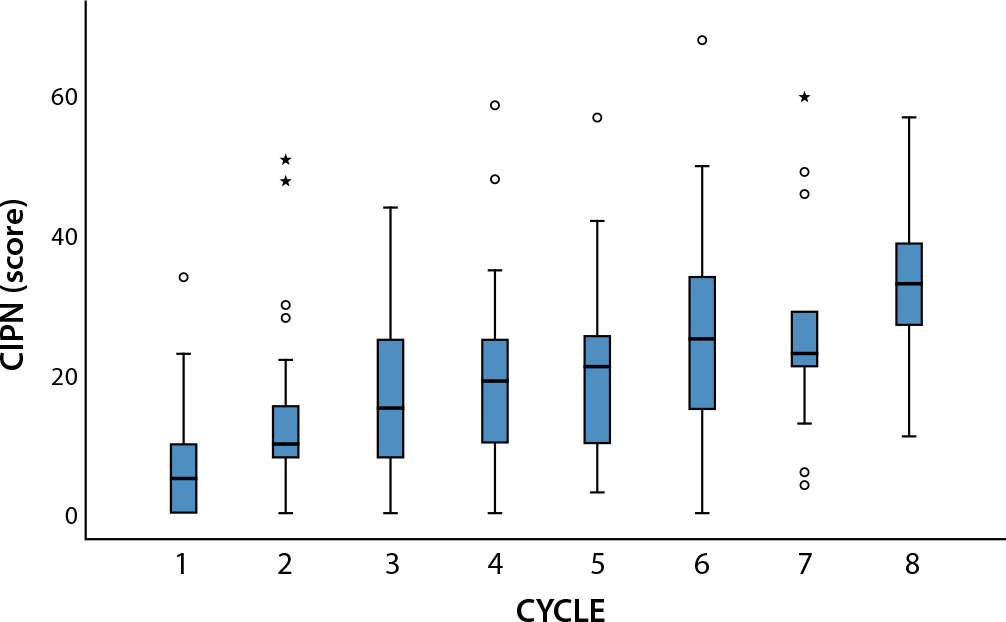
-
ORIGINAL ARTICLE01-30-2023
Educational material production and validity: educational instrument for home care for premature newborns
Revista Brasileira de Enfermagem. 2023;76(1):e20210648
Abstract
ORIGINAL ARTICLEEducational material production and validity: educational instrument for home care for premature newborns
Revista Brasileira de Enfermagem. 2023;76(1):e20210648
DOI 10.1590/0034-7167-2021-0648
Views0See moreABSTRACT
Objective:
to produce and validate a booklet, based on Jean Watson’s Theory, on home care for premature newborns, based on caregivers’ experiences.
Method:
a methodological study, developed in the following stages: diagnosis of knowledge needs about home care; survey of scientific content; educational material production; and validity by judges/experts.
Results:
the literature review resulted in 19 articles. The main themes (breastfeeding, bath care, bond building, infection prevention and support network) were listed for producing the booklet “Booklet for Premature Newborns: Demystifying Home Care”. The booklet content and appearance received the overall Content Validity Index of 0.85, considered suitable within the scientific rigor of validity.
Final considerations:
the booklet produced and validated is an educational material whose main role is to provide knowledge and awaken caregivers’ autonomy in providing home care to newborns.
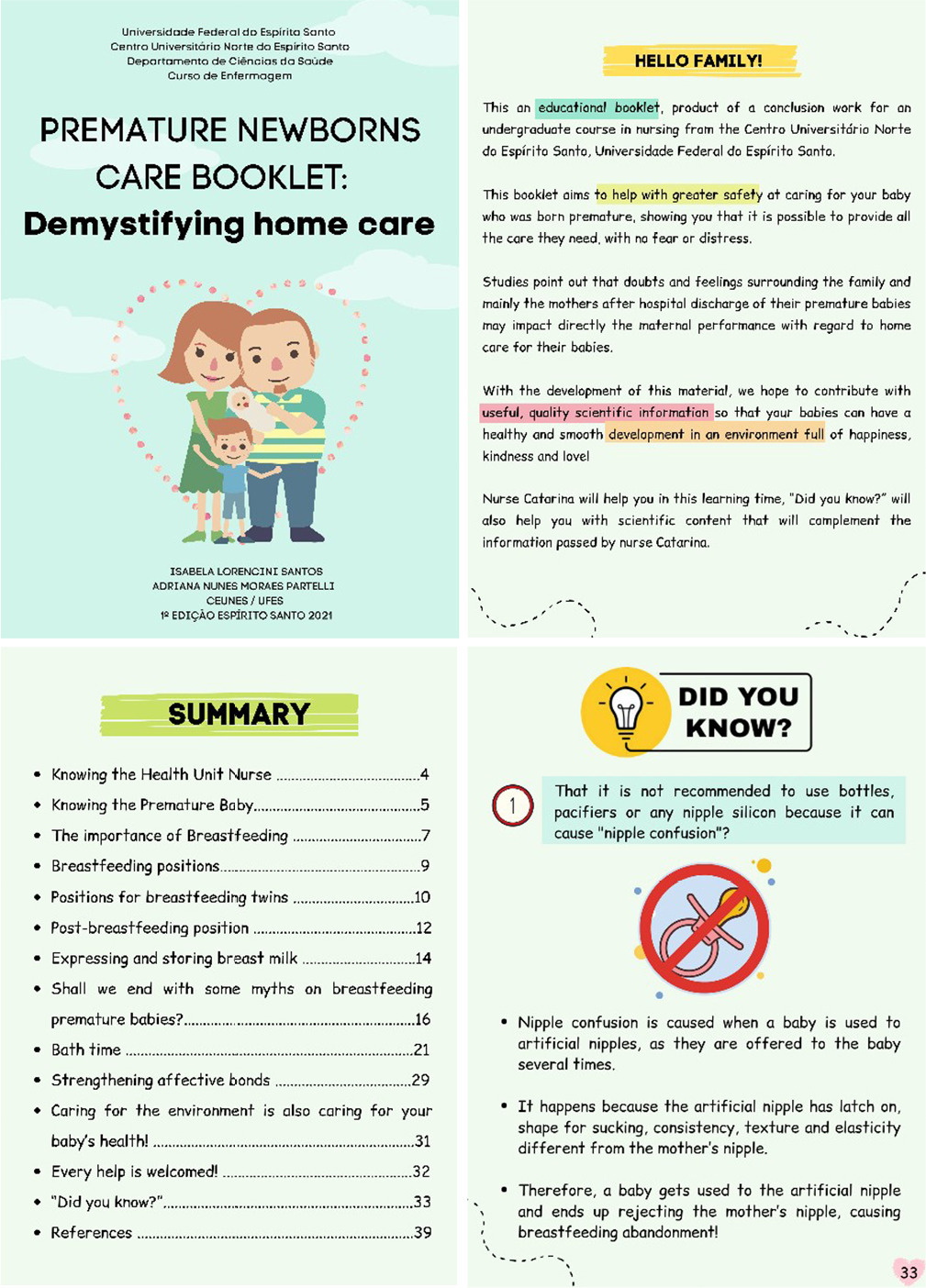
-
ORIGINAL ARTICLE01-30-2023
Development and validation of an instrument for the evaluation of HIV care in Primary Health Care
Revista Brasileira de Enfermagem. 2023;76(1):e20220247
Abstract
ORIGINAL ARTICLEDevelopment and validation of an instrument for the evaluation of HIV care in Primary Health Care
Revista Brasileira de Enfermagem. 2023;76(1):e20220247
DOI 10.1590/0034-7167-2022-0247
Views0See moreABSTRACT
Objective:
To develop and validate an instrument to evaluate the decentralization process of care for People Living with HIV in Primary Health Care.
Method:
Methodological study, developed in four stages: elaboration of the logical model based on the triad Structure-Process-Outcomes; development of the instrument; content validation by expert judges and technical reviewers; and semantic validation. Online questionnaires were used, and the Kappa index was used for analysis.
Results:
The instrument with 68 items and 8 factors was submitted to validation by expert judges who recommended the exclusion of 3 items and the alteration of 2 factors. In the validation by technical reviewers, 2 items were excluded and 6 factors were highlighted; the agreement index was ≥0.75. In the semantic validation, 87.3% of the judges answered “totally agree” for the items presented.
Conclusion:
The instrument is validated for its content, has 63 items and has the potential to assess the care provided for people living with HIV in Primary Health Care.

-
RESEARCH01-01-2018
Assistance flowchart for pain management in a Neonatal Intensive Care Unit
Revista Brasileira de Enfermagem. 2018;71:1281-1289
Abstract
RESEARCHAssistance flowchart for pain management in a Neonatal Intensive Care Unit
Revista Brasileira de Enfermagem. 2018;71:1281-1289
DOI 10.1590/0034-7167-2017-0265
Views0See moreABSTRACT
Objective:
To describe and discuss the process of developing a flowchart collectively constructed by the health team of a Neonatal Intensive Care Unit for the management of neonatal pain.
Method:
This is a descriptive and an exploratory study with a qualitative approach that used Problem-Based Learning as a theoretical-methodological framework in the process of developing the assistance flowchart for the management of neonatal pain.
Results:
Based on this methodology, there was training in service and the discussion of key points of pain management by the health team, which served as input for the construction of the flowchart.
Final considerations:
The assistance flowchart for pain management, based on scientific evidence, provided means to facilitate the decision-making of the health team regarding the pain of the newborn. It is suggested to use the flowchart frequently to promote the permanent education of the team and identify possible points to be adjusted.

-
RESEARCH01-01-2018
The adolescent and the institutionalization: understanding the phenomenon and meanings attributed to it
Revista Brasileira de Enfermagem. 2018;71:1373-1380
Abstract
RESEARCHThe adolescent and the institutionalization: understanding the phenomenon and meanings attributed to it
Revista Brasileira de Enfermagem. 2018;71:1373-1380
DOI 10.1590/0034-7167-2017-0242
Views1See moreABSTRACT
Objective:
To understand the meaning of being institutionalized and in conflict with the law for the institutionalized adolescent.
Method:
A qualitative, phenomenological-comprehensive study carried out in a Socio-educational Service Foundation in the northern region of Brazil, with 05 institutionalized adolescents. The analysis was carried out under the understanding of the content suggested by Heidgger, thus allowing the construction of analytical categories for a hermeneutical interpretation.
Results:
Conflicting with the law means something negative and bad for the institutionalized adolescents, in which they understand that although there is deprivation of liberty, the period of hospitalization is an important moment for the reflection on the need to start over.
Conclusion:
The meaning of conflicting with the law goes far beyond a simple word, act or behaviour, it is something that only those who experience the phenomenon are able to unveil, arouse deep feelings and provide reflection to the adolescent about the damages caused by the infraction.
-
RESEARCH01-01-2018
Identification of post-cesarean surgical site infection: nursing consultation
Revista Brasileira de Enfermagem. 2018;71:1395-1403
Abstract
RESEARCHIdentification of post-cesarean surgical site infection: nursing consultation
Revista Brasileira de Enfermagem. 2018;71:1395-1403
DOI 10.1590/0034-7167-2017-0325
Views0See moreABSTRACT
Objective:
To describe the profile of women in relation to their living conditions, health status and socio-demographic profile, correlating it with the presence of signs and symptoms suggestive of post-cesarean surgical site infection, identifying information to be considered in the puerperium consultation performed by nurses and proposing a roadmap for the systematization of care.
Method:
Quantitative, exploratory, descriptive, cross-sectional and retrospective review of medical records of women who had cesarean deliveries in 2014, in the city of São Paulo.
Results:
89 medical records were analyzed, 62 of them with incomplete information. In 11, there was at least one of the signs and symptoms suggestive of infection.
Conclusion:
Given the results of the study, the systematization of puerperal consultation is essential. The roadmap is an instrument that can potentially improve the quality of service and the recording of information.
-
RESEARCH01-01-2018
Nursing laboratory and critical education of nurses: approaches and distances
Revista Brasileira de Enfermagem. 2018;71:1500-1506
Abstract
RESEARCHNursing laboratory and critical education of nurses: approaches and distances
Revista Brasileira de Enfermagem. 2018;71:1500-1506
DOI 10.1590/0034-7167-2017-0339
Views1See moreABSTRACT
Objective:
to analyze the contribution of the laboratory of nursing to the critical education of nurses.
Method:
qualitative study, conducted among 18 professors of higher education institutions, being one public and the other private. Data were collected between February and November of 2016 by means of semi-structured interview. To analyze data, it was used a content analysis in the thematic modality.
Results:
it was observed the emphasis in the technical skills development by propagation of behavior and practices; the creation of bonds between professors and students happens on the limit of good interpersonal relationship; the laboratory of nursing may help the critical reflection about the practice, being a place that allows the learning of ethics.
Final considerations:
the nurse education, carried out by the laboratory of nursing, have to overcome the emphasis in the uncritical reproduction of practices and to observe the nurse’s power to think about the reality in the meaning of its modification.
-
RESEARCH01-01-2018
Introduction of the School Health Program in the city of Cascavel, Paraná State: report of nurses
Revista Brasileira de Enfermagem. 2018;71:1540-1547
Abstract
RESEARCHIntroduction of the School Health Program in the city of Cascavel, Paraná State: report of nurses
Revista Brasileira de Enfermagem. 2018;71:1540-1547
DOI 10.1590/0034-7167-2017-0188
Views1See moreABSTRACT
Objective:
to understand the introduction of the School Health Program in the city of Cascavel, Paraná State, as opposed to the report of nurses.
Method:
a qualitative study with fifteen participants. The data were collected from April to August 2015, through semi-structured interviews, analyzed by content analysis and thematic modality.
Results:
the category “Introduction process” of the School Health Program integrates the subcategories “Identified health problems” and the “Challenges of intersectoriality”. The program was implemented quickly, with a fragile training of professionals to perform in the phases that compose it. Structural conditions of schools, human and material resources, and emerging intersectoral interaction were identified obstacles. The integration of the health, school, and family constitutes the program’s potentiality.
Final considerations:
it is understood that the actions of the program were based on health assessments of students, and it is necessary for professionals and managers to discuss and analyze the obstacles identified to achieve all the proposed objectives.
-
RESEARCH01-01-2018
Knowledge about precautions in Primary Health Care: tool validation
Revista Brasileira de Enfermagem. 2018;71:1589-1595
Abstract
RESEARCHKnowledge about precautions in Primary Health Care: tool validation
Revista Brasileira de Enfermagem. 2018;71:1589-1595
DOI 10.1590/0034-7167-2017-0886
Views0See moreABSTRACT
Objective:
To elaborate and validate a tool to assess knowledge and behavior of nursing professionals about standards and specific precautions in the Primary Health Care.
Method:
Methodological study of the elaboration and validation of the tool by thirteen experts judges, using a Likert scale of 4 points, with Content Validity Index ≥ 0.80, on clarity, relevance and pertinence.
Results:
A tool composed of 47 dichotomous questions to assess knowledge and 12 questions, with five options of answers, for the referred behavior. In the validation, only one item was deleted, related to the “Hands Hygiene” axis and one item was reformulated, regarding “Use of Common Gloves” and another 11 changed writing. The tool as a whole was assessed for relevance, comprehensiveness and representativeness within the scope of the topic investigated.
Conclusion:
The developed tool has been validated and is now available for use in Primary Health Care.
-
RESEARCH01-01-2018
Training in diabetes education: meanings attributed by primary care nurses
Revista Brasileira de Enfermagem. 2018;71:1611-1618
Abstract
RESEARCHTraining in diabetes education: meanings attributed by primary care nurses
Revista Brasileira de Enfermagem. 2018;71:1611-1618
DOI 10.1590/0034-7167-2017-0792
Views1See moreABSTRACT
Objective:
seize meanings attributed by primary care nurses to training in diabetes education.
Method:
exploratory and descriptive study, with a qualitative approach, with twenty primary care nurses; semistructured interview script, with interviews processed in the IRaMuTeQ software and analyzed through the Descending Hierarchical Classification. The results were subsidized in the Representational Theory of Meaning.
Results:
nurse training in diabetes education is insufficient for holistic action, although it allows the community to be instrumentalized in specific issues about the disease, using the limited tools available, especially lectures. Nurses find themselves in a context of challenges, improvisations, weaknesses, and limitations that determine the meaning attributed to diabetes education and subsequent actions.
Conclusion:
the meanings attributed by the nurses revealed an incipient training, which limits the quality of care provided and instigates the search for qualification.

-
RESEARCH01-01-2018
Nursing international student mobility in the University of São Paulo
Revista Brasileira de Enfermagem. 2018;71:1619-1625
Abstract
RESEARCHNursing international student mobility in the University of São Paulo
Revista Brasileira de Enfermagem. 2018;71:1619-1625
DOI 10.1590/0034-7167-2017-0754
Views1See moreABSTRACT
Objective:
To characterize the experiences of undergraduate students of the School of Nursing of the University of São Paulo (EEUSP) who participated in international mobility programs between January 2011 and July 2017.
Method:
Exploratory, descriptive study with quantitative approach. Of 68 reports, only 38 (56%) were considered valid and were submitted to descriptive statistical analysis. Data were categorized in general, institutional, academic and cultural aspects and cost of living.
Results:
The main destination was Portugal and the years with most participation were 2012 and 2013. The mean stay was six months and the students took a mean of three to four courses. The main funder was the university of origin.
Conclusion:
Academic activities were limited to theoretical and practical courses, with little insertion in research. There is a need to increase investment in learning other languages and to expand partnerships with larger centers of foreign education and research.
-
EXPERIENCE REPORT12-04-2020
COVID-19 pandemic: report on the use of auriculotherapy to optimize emergency workers’ health
Revista Brasileira de Enfermagem. 2020;73:e20200507
Abstract
EXPERIENCE REPORTCOVID-19 pandemic: report on the use of auriculotherapy to optimize emergency workers’ health
Revista Brasileira de Enfermagem. 2020;73:e20200507
DOI 10.1590/0034-7167-2020-0507
Views0See moreABSTRACT
Objective:
To report the use of auriculotherapy to optimize emergency workers’ health during the COVID-19 pandemic.
Methods:
Experience report of auriculotherapy application in 48 workers of a mobile emergency care service center located in a city in the Northeast of Brazil.
Results:
Six auriculotherapy sessions were held, each lasting eight minutes, based on specific protocols in the area and Chinese energy physiology. The aim of the practice was to contribute to the improvement of physical (pain) and emotional (anxiety, stress) symptoms, and the promotion of greater health and willingness to work. In addition, the experimentation of this practice was thought of as a pilot for the creation of a care service for workers.
Final Considerations:
In the report of auriculotherapy, the description of its application and its positive and negative points in relation to professionals working in the pandemic scenario were considered and its continuity was requested.

-
ORIGINAL ARTICLE06-01-2020
Nursing knowledge patterns: nurses’ image and role in society perceived by students
Revista Brasileira de Enfermagem. 2020;73(4):e20180959
Abstract
ORIGINAL ARTICLENursing knowledge patterns: nurses’ image and role in society perceived by students
Revista Brasileira de Enfermagem. 2020;73(4):e20180959
DOI 10.1590/0034-7167-2018-0959
Views0See moreABSTRACT
Objectives:
to understand high school students’ perception about the nurse’s image and role in society, from nursing knowledge patterns.
Methods:
phenomenographic qualitative study, developed between October 2017 and January 2018, in a public university in the countryside of the state of São Paulo, with eight Interdisciplinary Higher Education Program (Programa de Formação Interdisciplinar Superior) students. The findings were collected through semi-structured interviews and analyzed by the phenomenography framework, supported by rereading nursing knowledge patterns.
Results:
two categories emerged: Perception of nurses’ image, which contemplates their positive and negative characteristics, attributes and place where they operate; and Nurses’ role in society, in which their work is compared with physicians’.
Final Considerations:
despite their essential role in care, subordination to medical knowledge and lack of knowledge of nurses’ functions still reflect their image.
-
ORIGINAL ARTICLE05-24-2021
Critical thinking in nursing training: evaluation in the area of competence Education in Health
Revista Brasileira de Enfermagem. 2021;74:e20200979
Abstract
ORIGINAL ARTICLECritical thinking in nursing training: evaluation in the area of competence Education in Health
Revista Brasileira de Enfermagem. 2021;74:e20200979
DOI 10.1590/0034-7167-2020-0979
Views0See moreABSTRACT
Objective:
To analyze the constitution of critical thinking in nursing training in the approach by competence and the integrated curriculum, considering the evaluation process by capturing its challenges, and proposing overcoming strategies.
Methods:
Qualitative. In the first phase of data collection, interviews were conducted with twenty-four professors, nine preceptors, and fifteen students to reconstruct the profile of competence, and in the second phase, a workshop to validate the profile identified challenges and proposals. The Collective Subject Discourse was used to analyze the interviews and the holistic competence reference in reconstructing the profile.
Results:
The critical thinking is built based on experiences in the world of work, and evaluation is the conductor of reflections towards emancipation.
Final considerations:
It signals the importance of professor training in the learning evaluation and working with the collective construction of subjects to overcome challenges that happen in the changes of training.
-
ORIGINAL ARTICLE08-19-2019
Evaluation of nurse’s performance in telemedicine
Revista Brasileira de Enfermagem. 2019;72(4):933-939
Abstract
ORIGINAL ARTICLEEvaluation of nurse’s performance in telemedicine
Revista Brasileira de Enfermagem. 2019;72(4):933-939
DOI 10.1590/0034-7167-2018-0313
Views0See moreABSTRACT
Objective:
Describe the nurse’s role in the Telemedicine Program in Cardiology implanted in Pernambuco, Brazil.
Methods:
Qualitative study, with a target audience of nurses, performed between July and December 2016 at the Emergency Care Units. Data were collected through an online instrument, consisting of open and closed questions, performed with 19 professionals. The data were analyzed through the discourse of the collective subject by QuantiQualisoftware.
Results:
The sample consisted of 19 nurses, mostly female (80%), with a mean age of 30 years old. Two central ideas were constructed: nurses’ knowledge about the Telemedicine Program in Cardiology; and actions developed by nurses. Also, a flow of the program’s assistance was built.
Final considerations:
The nurse in Telecardiology performs functions of assistance and continuing education of monitoring and training for patients.
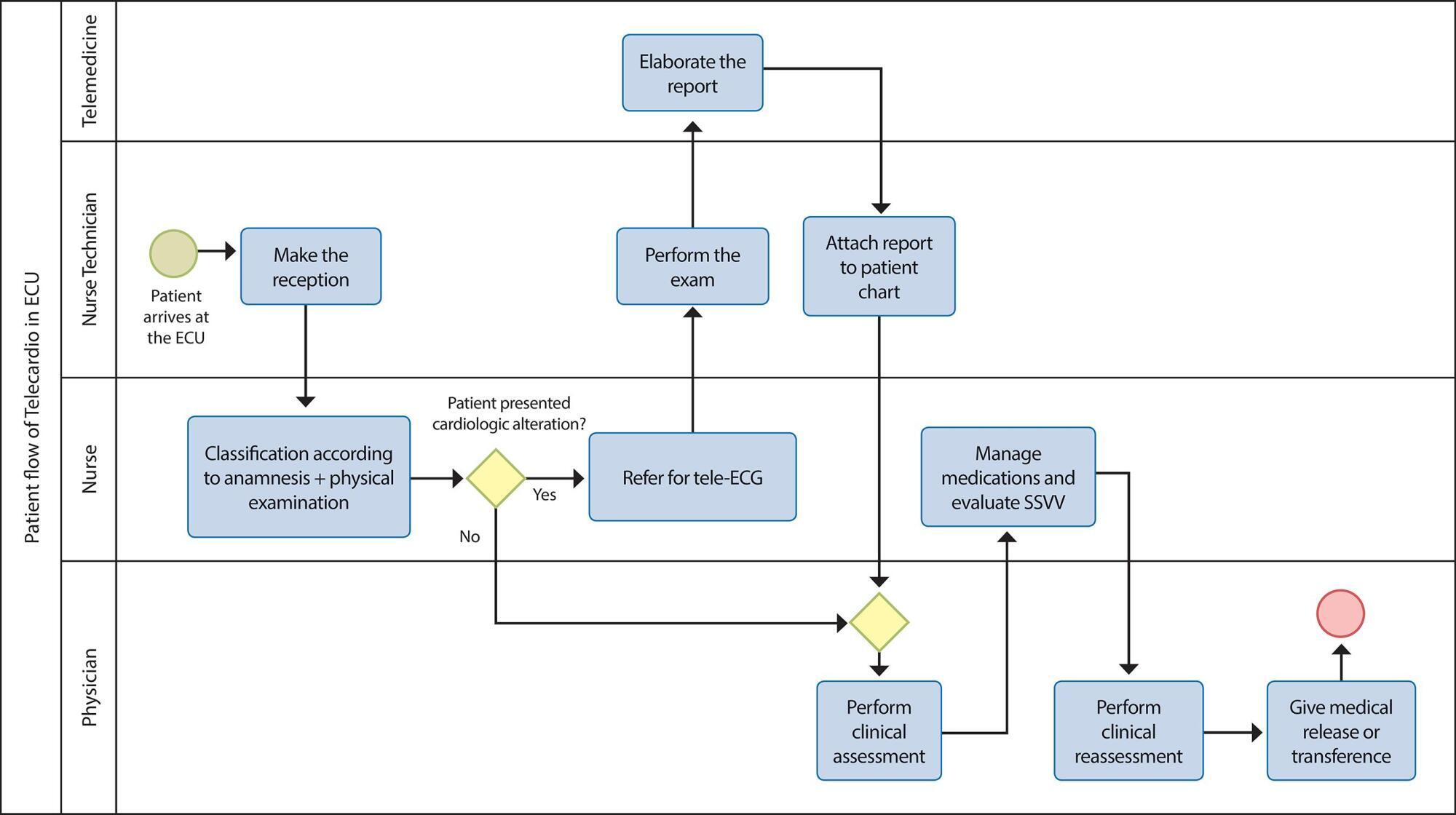
-
ORIGINAL ARTICLE04-03-2020
Analysis of the guiding rules of the nurse technician’s practice in Brazil
Revista Brasileira de Enfermagem. 2020;73(3):e20180322
Abstract
ORIGINAL ARTICLEAnalysis of the guiding rules of the nurse technician’s practice in Brazil
Revista Brasileira de Enfermagem. 2020;73(3):e20180322
DOI 10.1590/0034-7167-2018-0322
Views0INTRODUCTIONThe institutionalization of nursing as a profession is characterized by the division of labor, marked by discipline and hierarchy, with the participation of several active agents, among which we can cite the nurse, the nurse technician, the nursing assistant, and the nursing attendant. The latter, although mentioned in the legislation, has been extinct since the […]See more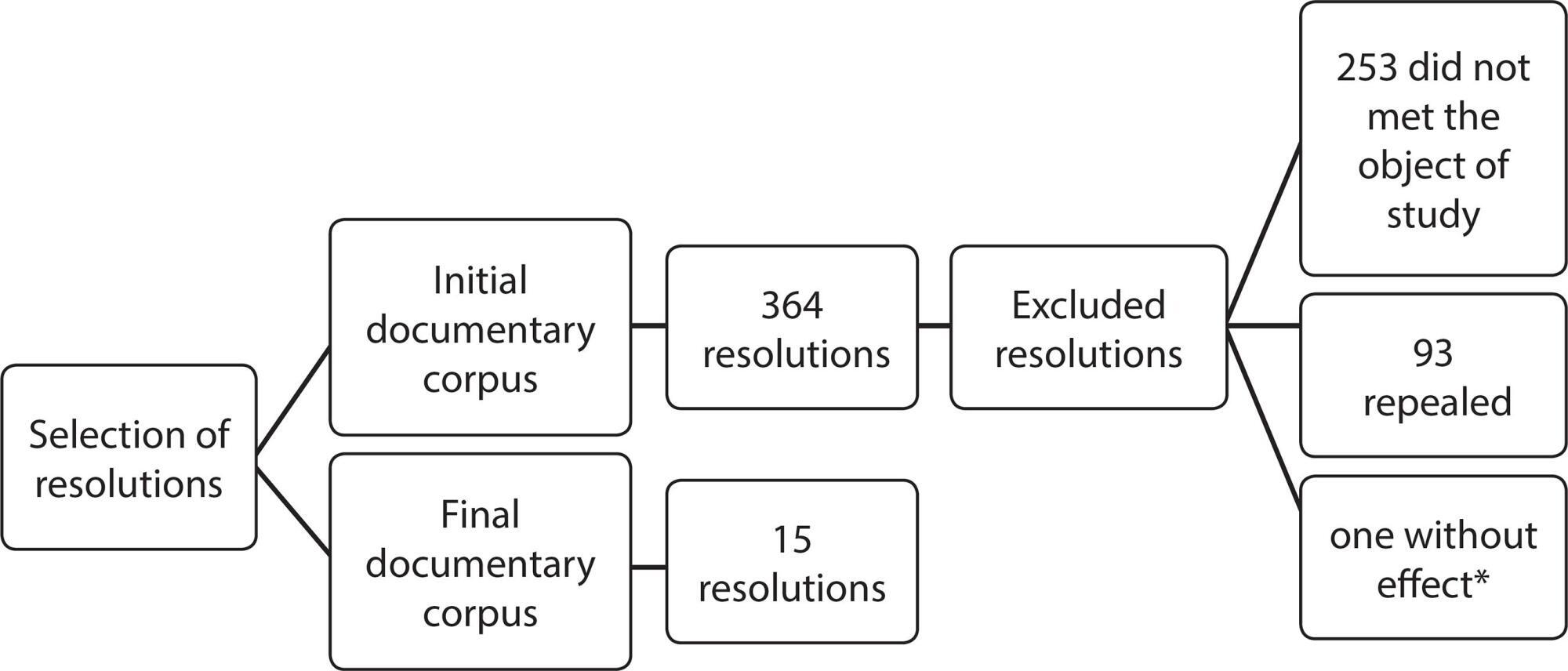
-
08-07-2023
Chemsex and its repercussions on the health of men who have sex with men (MSM): a global health perspective
Revista Brasileira de Enfermagem. 2023;76(3):e20230004
Abstract
Chemsex and its repercussions on the health of men who have sex with men (MSM): a global health perspective
Revista Brasileira de Enfermagem. 2023;76(3):e20230004
DOI 10.1590/0034-7167-2023-0004
Views0See moreABSTRACT
Objectives:
to discuss the repercussions of chemsex on the health of men who have sex with men (MSM), contextualizing it in a global health scenario and pointing out the implications for nursing care.
Methods:
theoretical-reflexive study based on scientific literature and concepts related to global health.
Results:
we present the epidemiology of the chemsex phenomenon, the main demands of the field, the reasons why it has become a global public health problem, and the implications for nursing practice.
Final Considerations:
chemsex is growing in all age groups of MSM and is globally benefiting from location-based applications to gain magnitude, finding an important potential audience in the migrant population. Nursing structures can help accelerate the proposal and implementation of biomedical and behavioral measures to address chemsex in its entirety, qualifying care and inducing teamwork with interprofessional collaboration.
-
ORIGINAL ARTICLE09-29-2022
Entrepreneurship among Undergraduate Nursing Students at a public university
Revista Brasileira de Enfermagem. 2022;75(1):e20201388
Abstract
ORIGINAL ARTICLEEntrepreneurship among Undergraduate Nursing Students at a public university
Revista Brasileira de Enfermagem. 2022;75(1):e20201388
DOI 10.1590/0034-7167-2020-1388
Views0See moreABSTRACT
Objectives:
to identify undergraduate nursing students’ entrepreneurial tendency at a public university.
Methods:
cross-sectional study, with a quantitative approach, with 135 undergraduate nursing students from a public university in the interior of the state of Rio Grande do Sul, Brazil. Data were collected using a socio-professional characterization form and a General measure of Enterprising Tendency test and analyzed using descriptive statistics.
Results:
among the five entrepreneurial tendencies, students presented results equal or above average in two dimensions: Drive and Determination (82.2%) and Need for Success (51.1%). The Creative tendency was the dimension with the highest percentage of participants below the average (68.9%). However, students in research or extension groups scored equal or above average in all five entrepreneurial tendencies.
Conclusions:
students showed low entrepreneurial tendencies, indicating the need for a broader approach to the subject in nursing education.
-
ORIGINAL ARTICLE03-17-2023
Production and validation of an educational video on the use of the Z-Track Technique
Revista Brasileira de Enfermagem. 2023;76(2):e20220439
Abstract
ORIGINAL ARTICLEProduction and validation of an educational video on the use of the Z-Track Technique
Revista Brasileira de Enfermagem. 2023;76(2):e20220439
DOI 10.1590/0034-7167-2022-0439
Views0See moreABSTRACT
Objective:
to create and validate an educational video on intramuscular drug administration using the Z-track technique.
Methods:
the Delphi Technique was used to validate the script. PhDs in Nursing and PhDs in Social Communication with experience in the production of educational videos participated in the process. After editing, the video was validated by three nursing professors and assessed by students of the undergraduate nursing program at a public university.
Results:
the video was validated by the examiners with 100% agreement in three rounds for script validation and in two for video validation after editing. The duration of the video was 9 minutes.
Conclusion:
after validation by the examiners, students assessed the video and considered it suitable for learning. We This video is expected to aid in the training of nursing professionals and the enhancement of patient care.
Search
Search in:
Nuvem de Tags
Adolescente (85) Atenção Primária à Saúde (239) COVID-19 (91) Criança (91) Cuidados de Enfermagem (269) Educação em Enfermagem (151) Educação em Saúde (139) Enfermagem (930) Enfermagem Pediátrica (86) Estudantes de Enfermagem (77) Estudos de Validação (131) Família (87) Idoso (208) Promoção da Saúde (99) Qualidade de Vida (104) Saúde do Trabalhador (86) Saúde Mental (145) Saúde Pública (82) Segurança do Paciente (150) Tecnologia Educacional (100)



